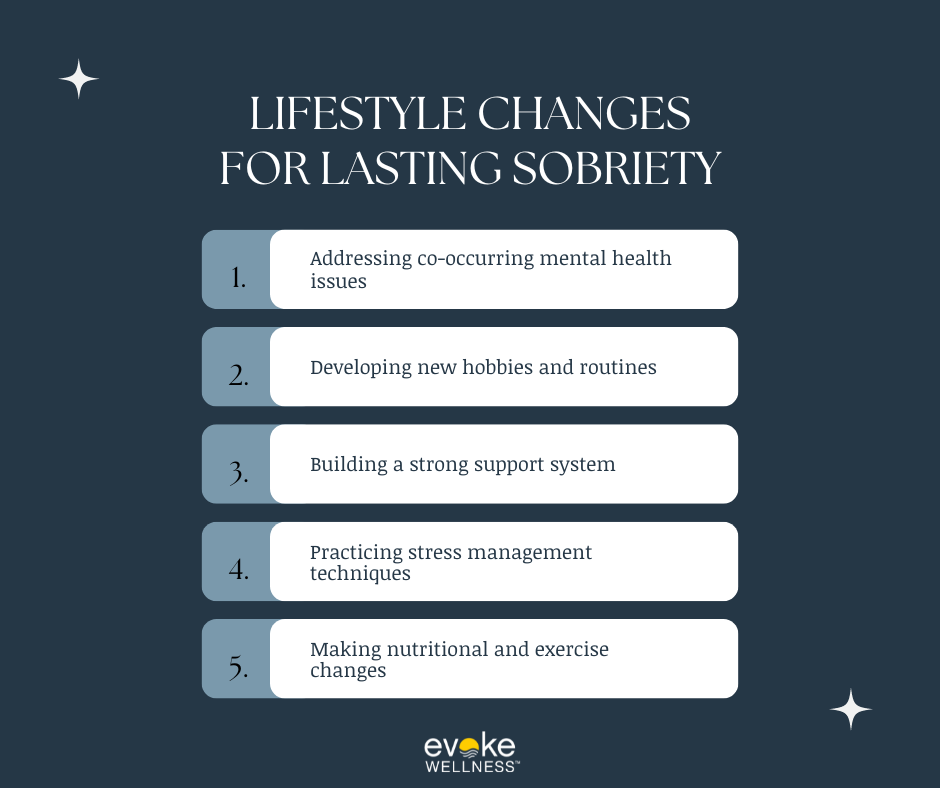As you navigate the challenging journey of overcoming alcoholism, it’s crucial to understand the latest treatment options available in 2024. Recent studies show that approximately 14.5 million Americans struggle with alcohol use disorder, highlighting the pressing need for effective interventions. At Evoke Wellness at Miramar, we offer comprehensive solutions tailored to your unique needs. From medically supervised drug and alcohol detox to our specialized alcohol addiction treatment program, our evidence-based approach addresses both the physical and psychological aspects of addiction. This article will explore the most current and successful strategies for treating alcoholism, empowering you with the knowledge to make informed decisions about your recovery path.
Together, let’s embrace the journey to recovery and the promise of a new beginning. Call us at (833) 819-6066 today or reach out online.
Understanding Alcohol Use Disorder
Signs & Symptoms
Alcohol use disorder (AUD) is a chronic brain disease characterized by compulsive alcohol use, loss of control over intake, and a negative emotional state when not using. Key symptoms include:
- Inability to limit alcohol consumption
- Craving or strong urge to drink
- Continuing use despite problems
- Building tolerance requiring more alcohol
Prevalence & Impact
- AUD affects over 15 million adults in the U.S., yet only 1 in 10 receive treatment.
- Excessive drinking is the 3rd leading preventable cause of death in the U.S.
- AUD costs the U.S. $249 billion annually in health care, lost productivity, crime, and other expenses.
Risk Factors
Many factors increase AUD risk, including genetics, mental health disorders, social environment, and early exposure to alcohol. However, AUD can impact anyone regardless of age, ethnicity, or background.
Dual Diagnosis
Many with AUD also suffer from co-occurring mental health issues like depression, anxiety, PTSD or other substance abuse disorders. Integrated treatment addressing both is crucial for recovery.
When Is It Time for Alcohol Addiction Treatment?
Signs of Alcohol Use Disorder
- Inability to control alcohol intake or stop drinking once started
- Spending excessive time obtaining, using, or recovering from alcohol effects
- Neglecting responsibilities at work, school, or home due to alcohol use
- Continuing to drink despite interpersonal conflicts caused by alcohol
- Engaging in risky behaviors while under the influence, like driving impaired
- Developing a tolerance and needing more alcohol to achieve the desired effects
Risks of Untreated Alcoholism
- Severe withdrawal symptoms like seizures, hallucinations (delirium tremens)
- Increased risk of liver disease, heart problems, certain cancers
- Worsening mental health issues like depression and anxiety
- Strained relationships, domestic violence, job loss, legal troubles
- Risk of developing a life-threatening alcohol overdose
According to the National Institute on Alcohol Abuse and Alcoholism, an estimated 14.5 million adults aged 18 and older had Alcohol Use Disorder (AUD) in 2019. The time for professional alcohol addiction treatment is now if the following criteria apply:
Need for Alcohol Addiction Treatment
- Failed attempts to cut down or quit drinking on your own
- Experiencing withdrawal symptoms when stopping alcohol use
- Alcohol use has negatively impacted personal/professional life
- Drinking is causing or worsening physical/mental health issues
Seeking help from an accredited alcohol rehab facility like Evoke Wellness at Miramar can provide a safe, medically-supervised detox and comprehensive treatment plan to achieve long-term sobriety.
Detoxing from Alcohol
The First Step
Detoxing from alcohol is often the critical first step in overcoming alcoholism. The alcohol detox process helps the body adjust to the absence of alcohol, flushing out toxins and managing withdrawal symptoms. It requires medical supervision due to potentially life-threatening complications like seizures or delirium tremens.
Professional Support
Attempting to detox alone can be extremely dangerous and ineffective long-term. Professional alcohol detox programs provide a safe, controlled environment with around-the-clock care. Medical staff can administer medications to ease withdrawal effects and monitor vital signs. Counseling helps prepare patients mentally and emotionally for the next phase of addiction treatment.
Withdrawal Challenges
The alcohol withdrawal timeline varies, but symptoms typically peak within 24-72 hours after the last drink. Common issues include nausea, tremors, anxiety, and insomnia. Having trained professionals guiding the process significantly improves detox completion rates and reduces relapse risks. After stabilization, comprehensive therapy can address the root psychological factors driving alcoholism.
Treatment Options for Alcoholism
Comprehensive Approach
Overcoming alcohol addiction requires a comprehensive, multi-pronged approach tailored to individual needs. Effective treatment combines behavioral therapies, medications, and support groups to address the physical, psychological, and social aspects of alcoholism. A holistic strategy increases the chances of lasting recovery.
Medical Detox
The first step is often medical detoxification under professional supervision. This process safely manages withdrawal symptoms as alcohol leaves the body, with medications used to alleviate severe side effects. Detox prepares individuals for further treatment by stabilizing their condition.
Therapy and Counseling
Behavioral therapies like cognitive-behavioral therapy (CBT) are essential for modifying harmful drinking patterns. These evidence-based approaches help identify triggers, develop coping mechanisms, and build a sober support system. Group counseling provides a supportive environment for sharing experiences and encouragement.
Medication-Assisted Treatment
Certain medications can reduce alcohol cravings and prevent relapse when combined with counseling. Anti-craving drugs like naltrexone and acamprosate have shown promising results in maintaining abstinence and supporting long-term recovery.
Continuing Care
Recovery is an ongoing process requiring commitment and lifestyle changes. Aftercare planning, including ongoing therapy, alumni support groups, and sober living arrangements, can help individuals maintain sobriety and prevent relapse in the long run.
Medications for Alcohol Dependence
Comprehensive treatment for alcohol dependence often incorporates medication-assisted treatment (MAT) alongside behavioral therapies. MAT utilizes FDA-approved medications to alleviate cravings and withdrawal symptoms, increasing the chances of successful recovery.
Approved Medications
- Naltrexone (Vivitrol) blocks opioid receptors in the brain, reducing alcohol’s rewarding effects and curbing cravings.
- Acamprosate (Campral) helps restore balance in brain chemistry disrupted by long-term alcohol abuse.
- Disulfiram (Antabuse) produces unpleasant effects when combined with alcohol, deterring further drinking.
Combining Therapy & Medication
While medications can aid in managing physical aspects of addiction, comprehensive alcohol rehab programs incorporate evidence-based therapies like cognitive-behavioral therapy (CBT) and dialectical behavior therapy (DBT). This integrated approach addresses underlying psychological factors fueling substance abuse.
Insurance Coverage
Leading insurance providers like United Healthcare, Cigna, and Aetna offer comprehensive coverage for MAT and other addiction treatment services under the Mental Health Parity and Addiction Equity Act.
Choosing the Right Alcohol Rehab Program
Assessing Your Needs
The first step in choosing the right alcohol rehab program is to assess your specific needs and circumstances. Consider the severity of your addiction, any co-occurring mental health conditions, and your personal preferences for treatment approaches. According to research, effective alcohol rehab addresses both physical and psychological aspects of addiction through a comprehensive, personalized treatment plan.
Treatment Options
There are various levels of care available for alcohol addiction treatment:
- Medical Detox: This supervised process helps manage withdrawal symptoms safely and comfortably, preparing you for further treatment. Evoke Wellness at Miramar offers medical detox programs with 24/7 monitoring by addiction specialists.
- Inpatient/Residential Treatment: These intensive, highly structured programs provide round-the-clock support and therapies in a residential setting, allowing you to fully focus on recovery.
- Outpatient Treatment: These programs allow you to live at home while attending regular therapy sessions and support groups, suitable for those with less severe addictions or after completing inpatient treatment.
Evaluating Programs
When evaluating potential rehab programs, consider factors like:
- Evidence-Based Therapies: Look for programs incorporating proven approaches like cognitive-behavioral therapy (CBT) and dialectical behavior therapy (DBT).
- Dual Diagnosis Support: If you have co-occurring mental health conditions, choose a program offering integrated treatment for both issues.
- Aftercare and Alumni Programs: These provide ongoing support and resources to maintain sobriety and prevent relapse after completing the initial treatment program.
- Accreditation and Licensing: Ensure the facility is accredited and licensed by reputable organizations.
- Insurance Coverage: Many insurance providers, like United Healthcare and Aetna, cover various levels of addiction treatment.
Choosing the right alcohol rehab program is crucial for achieving lasting recovery. Take the time to research and find a program that aligns with your specific needs and goals.
Ongoing Recovery for Alcoholism
Recovery from alcoholism is an ongoing journey that requires commitment and support. After completing an evidence-based treatment program, individuals must actively maintain their sobriety through continued care and lifestyle changes.
Aftercare and Alumni Support
Reputable treatment centers like Evoke Wellness offer comprehensive aftercare programs and alumni support networks. These provide:
- Sober living homes for a structured transition
- Individual and group therapy sessions
- Relapse prevention planning
- Peer support groups and sober social activities
This ongoing support system helps reinforce the coping strategies and healthy habits developed during rehab.
Building a Recovery Community
An essential aspect of sustained recovery is building a supportive community. Surrounding oneself with others on the recovery path provides:
- Accountability and motivation
- Shared understanding and empathy
- A sense of belonging and hope
Group sessions, alumni events, and sober recreational activities facilitate these vital connections.
Lifestyle Changes for Lasting Sobriety
Long-term recovery requires a holistic lifestyle transformation. This may involve:

With dedication and the right resources, individuals can break free from the cycle of addiction for good.
FAQ: What is the Best Treatment for Alcohol Dependence?
Evidence-Based Therapies
The most effective treatments for alcohol dependence incorporate evidence-based therapies like cognitive-behavioral therapy (CBT) and dialectical behavior therapy (DBT). These psychotherapeutic approaches target the underlying thought patterns and behaviors driving alcohol misuse.
CBT helps individuals identify and modify harmful beliefs, while DBT focuses on developing healthy coping mechanisms and improving emotional regulation. Other proven modalities like acceptance and commitment therapy (ACT) and trauma-informed care are often integrated.
Comprehensive Continuum of Care
The optimal alcohol treatment plan involves a comprehensive continuum of care, ranging from medical detox to inpatient/residential rehab and outpatient programs. This multifaceted approach provides:
- Safe, medically-supervised detoxification to manage withdrawal
- Intensive inpatient treatment to establish a strong recovery foundation
- Continued outpatient therapy and counseling for relapse prevention
- Medication-assisted treatment like Vivitrol clinics when appropriate
Dual Diagnosis Treatment
For those with co-occurring mental health conditions like depression or anxiety, dual diagnosis treatment is essential. This integrated approach simultaneously addresses both the substance use disorder and mental illness through:
- Comprehensive assessments to identify all issues
- Personalized treatment plans targeting multiple diagnoses
- Psychotherapy and medication management as needed
- Skills training for improved functioning and quality of life
Holistic and Community Support
While clinical care is the foundation, holistic therapies and peer support enhance recovery outcomes. Elements like mindfulness, yoga, acupuncture, and sober living communities provide:
- Healthy coping strategies and lifestyle changes
- A sense of purpose, accountability and connection
- Ongoing encouragement and motivation to maintain sobriety
The most effective alcohol treatment combines psychotherapies, medical interventions, and holistic modalities tailored to each individual’s needs.
Conclusion
In conclusion, effective treatment for alcoholism in 2024 offers hope and healing for those struggling with addiction. By combining evidence-based approaches like medical detox, comprehensive therapy, and ongoing support, recovery is achievable.
With advances in addiction medicine and a range of treatment options available, there’s never been a better time to seek help. Your journey to recovery starts with reaching out – take that courageous first step today. A healthier, alcohol-free future is within reach.
Begin Your Journey with Evoke Wellness at Miramar
If you or a loved one is considering treatment, Evoke Wellness at Miramar invites you to contact us. Our compassionate team is ready to answer your questions, discuss your needs, and help you take the first steps toward recovery. In Miramar, you’ll find more than just a treatment program – you’ll discover a community dedicated to your wellness and success. Together, let’s embrace the journey to recovery and the promise of a new beginning. Call us at (833) 819-6066 today or reach out online.


